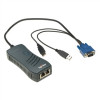Lantronix Spider KVM Lantronix Spider / SpiderDuo - User Guide - Page 58
Lan Interface Settings, IPv6 Settings (Firmware v3.0 or higher), Miscellaneous Network Settings
 |
View all Lantronix Spider KVM manuals
Add to My Manuals
Save this manual to your list of manuals |
Page 58 highlights
7: Interfaces Field Secondary DNS Server IP Address (optional) Description Enter the IP address of the Domain Name Server to be used if the Primary DNS Server cannot be reached. Lan Interface Settings Field Current LAN interface parameters LAN interface speed LAN interface duplex mode Description Displays current LAN interface settings. Manual setup may be required for older equipment. With autonegotiation on, the window displays the current state of the link. Note that the parameters of the second Ethernet port are not configurable, they remain at autonegotiate. Select the speed from the drop-down menu. Select the duplex mode from the drop-down menu. IPv6 Settings (Firmware v3.0 or higher) Field Enable IPv6 IPv6 address IPv6 address dynamic Link-local IPv6 address Description Select to enable IPv6. IPv6 address displays when enable IPv6 is selected, Assigned automatically by the system. Network address intended only for communications within one segment of a local network or a point-to-point link. Assigned automatically by the system. Miscellaneous Network Settings Field Remote Console & HTTPS port HTTP port TELNET port SSH port Bandwidth Limit Enable TELNET/SSH access Description Port number at which the Spider device Remote Console server and HTTPS server are listening. The default is 443. Port number at which the Spider device's HTTP server is listening. The default is 80. Port number at which the Spider device's Telnet server is listening. The default is 23. Port number at which the Spider device's SSH server is listening. The default is 22. The maximum network traffic generated through the Spider device's primary Ethernet port, in kilobits. If left blank, there is no bandwidth limitation applied. For security, the default is having Telnet and SSH disabled. Check the appropriate box (es) and set up the serial port for Telnet/SSH to use the Telnet console. Spider™ and SpiderDuo® KVM-over-IP Device User Guide 58















